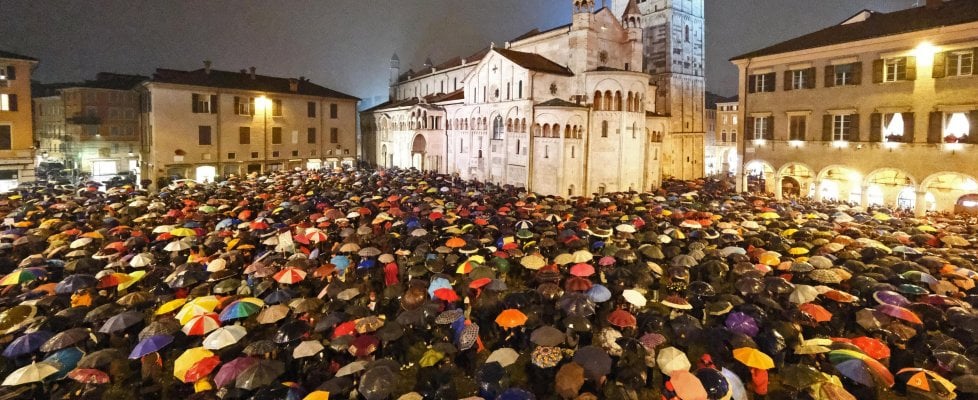Attilio Moro says the children of the left-wing Emilian establishment chose their name to suggest that if they stick together tightly, they are safer and able to protect themselves from the larger fish.

Sardines’ flash mob in Modena, Italy, Nov. 19, 2019. (Taleoma, Flickr, CC BY 2.0, Wikimedia Commons)
By Attilio Moro
in Brussels
Special to Consortium News
 At the end of January, the Partito Democratico (PD), the main political party of the Italian left, which lost votes nationwide in the last three elections, won the regional elections in Emilia, an area in Italy’s north, whose major city is Bologna.
At the end of January, the Partito Democratico (PD), the main political party of the Italian left, which lost votes nationwide in the last three elections, won the regional elections in Emilia, an area in Italy’s north, whose major city is Bologna.
The party defeated Matteo Salvini’s Lega, a right-wing populist party, that was well positioned to grab the region from the left, which had been governing Emilia since 1945 (with both the Communist Party until 1990, and then PDS-PD).
Salvini probably would have won if the Sardines hadn’t emerged on the political scene: This is a new movement launched by the children of the traditional left-wing Emilian establishment. The older generation had lost touch with their constituency, opening the doors to Salvini’s right-wing populism. Sardine’s organizers filled the town squares all over Italy with young people, who, in turn, pushed voters to turn out in big numbers in order to keep the right wing Lega out of power in the most ancient stronghold of the left. Sardines’ message, which has proved so popular, is simple: Let’s return to civilized politics and life, in general. Stop the insults, refrain from slandering opponents, be honest, transparent and listen to the people’s needs. The message adds that in order to launch a new type of Italian politics, people should not replace real participation with social media: It argues that the Internet and Facebook are the realm of manipulation and fake news rather than genuine discussion.
Mass Participation
The organization wants to defend democracy and civil society and adds there must be mass participation because without it, there will be no political regeneration. Above all, participants must use a new language that is non-aggressive and even playful to convey their political values.
The activists’ preferred way to connect with the public is through what they call a “flash mob,” where they describe their politics in 20 minutes, or the time it takes to draw a cartoon of a sardine, listen to a couple of activist songs, and then leave.
“People like it,” says Mattia Santori, who is from Bologna and the group’s spokesman – “because they participate with their whole bodies, brains and thoughts. In this way, the town squares are filled not with angry outbursts but with people who are willing to listen to something meaningful.”
With this simple message, Sardines was able to organize mass demonstrations in Bologna, Modena, Reggio Emilia, Rome and other Italian cities where in the last few years the populist Lega and Five Star Movement had emerged as the driving political force.
Santori, 32, has degrees in law and economics. He has assessed the environmental impact of investments. He’s also an appealing public figure because he loves sports and spends his weekends training a basketball team of handicapped children.
Santori, along with Giulia Trappoloni, 30, (a physiotherapist), Roberto Morotti, 30 (an engineer) and Andrea Garreffa, 30, (a tour operator), were disturbed by the poor state of Italian politics and decided to start the movement.
They agreed to call it Sardines, using the image of the small fish, which, if they stick together tightly, are safer and able to protect themselves from the larger fish. Many Italians, turned off by the state of current politics, responded enthusiastically.
How long will it last? No one knows. But one thing is certain: The mobilization of so many people who reacted so negatively to the political barbarism and sectarianism, prevented Salvini’s Lega from taking over the stronghold of the Italian left. The question, of course, is what Sardine must do to survive. The movement has suggested a new style, but it didn’t address the people’s problems.
Double-Edged Critique
Until now, the leaders seem more interested in political etiquette than mapping out a new course. Being the offspring of the traditional left, their actions are both a critique of Salvini’s populist messages and of their parents’ mistakes. They haven’t yet elaborated a critique of the Italian and European mainstream left.
While they can easily criticize Salvini, they must also assess the failures of the European left — specifically its uncritical acceptance of neo-liberalism, with its cozy relationship with the banks, its elitism and its detachment from people’s daily problems. Lacking such a critique, they will probably not retain their popularity. The Sardine say that politics is not their ambition: Instead, they only want to remain a social movement. But this means that others will capitalize on their popularity and do the job they should be tackling, empowered by their large number of followers.
The working class has been marginalized in Italy as well as in much of Europe. Its purchasing power (from salaries and pensions) has been drastically reduced. With the mainstream left’s complicity (exemplified by Gerhard Schroeder in Germany and Matteo Renzi in Italy), the labor market has been weakened, badly-paid part-time jobs have replaced the more secure jobs of the past, while the banks and finance capital have been coddled by leftist governments.
People are ready to fight — as the French “Gilet Jaunes” (Yellow Vests) have shown. But will Sardines’ new political etiquette be able to lead the fight and fill the political vacuum created by the debacle of the Italian and European left?
Attilio Moro is a veteran Italian journalist who was a correspondent for the daily Il Giorno from New York and worked earlier in both radio (Italia Radio) and TV. He has travelled extensively, covering the first Iraq war, the first elections in Cambodia and South Africa, and has reported from Pakistan, Lebanon, Jordan and several Latin American countries, including Cuba, Ecuador and Argentina. Presently, he is a correspondent on European affairs based in Brussels.
The views expressed are solely those of the author and may or may not reflect those of Consortium News.
If you value this original article, please consider making a donation to Consortium News so we can bring you more stories like this one.
Before commenting please read Robert Parry’s Comment Policy. Allegations unsupported by facts, gross or misleading factual errors and ad hominem attacks, and abusive or rude language toward other commenters or our writers will be removed. If your comment does not immediately appear, please be patient as it is manually reviewed. For security reasons, please refrain from inserting links in your comments.

Why hasn’t this author traced the connection to Soros? A google search shows this connection very well.
Progressive neoliberalism versus reactionary populism in Emilia Romagna
Summary of “Neoliberismo progressista e populismo reazionario… fra la via Emilia e il West”, di Militant, Sinistra in rete, 5 Feb 2020
sinistrainrete.info/politica-italiana/16906-militant-neoliberismo-progressista-e-populismo-reazionario-fra-la-via-emilia-e-il-west.html
Emilia Romagna vote in Italy reveals social polarization
The January 26th 2020 vote confirmed the existence of “two Emilias”, as the Cattaneo Institute called them, namely the peripheral, marginal, extensive Emilia with low population density, which voted for the League (shown in green on the maps) opposed to the central and urbanized Emilia characterized by high population density and physical, functional, social and symbolic complexity, which voted for the Democratic Party (shown in russet on the maps).
Expressing this opposition even more schematically, we could almost say that these two worlds, which are so different from each other from an economic, social and cultural standpoint, at the same time stand for the new bipolarity between progressive neoliberalism and reactionary populism.
This polarity is incompatible with the Marxist class-struggle approach that the left has always followed. To pursue a class-struggle schema the left must at all costs avoid being absorbed by either pole, i.e. the Democratic Party or the League. Accordingly our political struggle at this moment can only take place outside the institutions.
I’m hoping for a return to real progressivism, not the free market baloney Third Way. Bernie Sanders is the real progressive running. Bonus, he has numbers and receipts.
This is huge. Establishment Dems want incrementalism as a gift to moderate voters. Unfortunately there’s no time.
We really need to hope, but action is what is needed and we have a long way to go if we want any kind of decent policies and fairness to the majority of the population, and the environment which supports all life.